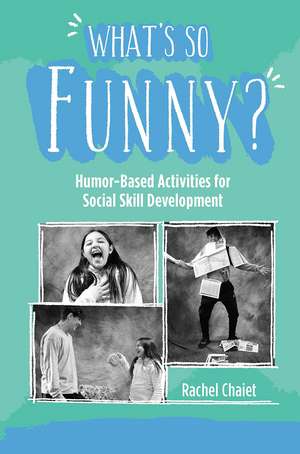What's So Funny?: Humor-Based Activities for Social Skill Development
Autor Rachel Chaieten Limba Engleză Paperback – 15 aug 2021
What’s So Funny? contains a curriculum of more than 50 activities that emphasize two main ideas. The first is that humor (linguistic or physical) can be taught to many individuals with autism spectrum disorder or other disorders through explicit instruction, exposure to various types of humor, and embracing the individual’s preferred sense of humor. The second is that humorous activities can be used to increase social engagement, which can sometimes be a challenge for those with developmental disabilities.
What’s So Funny? includes activities essential for individuals who:
- Appear to have a very limited concept or basic developmental level of humor
- Need to improve their understanding of socially appropriate humor
- Lack understanding of appropriate times to use humor
- Are nonverbal, have limited expressive communication skills, or use augmentative communication devices
- Have a difficult time initiating social interactions with their peers
| Toate formatele și edițiile | Preț | Express |
|---|---|---|
| Paperback (1) | 459.32 lei 43-57 zile | |
| Taylor & Francis – 15 aug 2021 | 459.32 lei 43-57 zile | |
| Hardback (1) | 977.12 lei 43-57 zile | |
| Taylor & Francis – 4 noi 2024 | 977.12 lei 43-57 zile |
Preț: 459.32 lei
Preț vechi: 483.49 lei
-5% Nou
Puncte Express: 689
Preț estimativ în valută:
87.92€ • 95.53$ • 73.90£
87.92€ • 95.53$ • 73.90£
Carte tipărită la comandă
Livrare economică 21 aprilie-05 mai
Preluare comenzi: 021 569.72.76
Specificații
ISBN-13: 9781630917203
ISBN-10: 1630917206
Pagini: 216
Dimensiuni: 152 x 229 x 15 mm
Greutate: 0.32 kg
Ediția:1
Editura: Taylor & Francis
Colecția Routledge
Locul publicării:Oxford, United Kingdom
ISBN-10: 1630917206
Pagini: 216
Dimensiuni: 152 x 229 x 15 mm
Greutate: 0.32 kg
Ediția:1
Editura: Taylor & Francis
Colecția Routledge
Locul publicării:Oxford, United Kingdom
Public țintă
Professional Practice & Development, Undergraduate Advanced, and Undergraduate CoreCuprins
Dedication Acknowledgments About the AuthorIntroduction Chapter 1 About This ProgramIntended AudienceIntended ParticipantsBenefits of the ProgramResearch-Based Strategies Chapter 2 Background InformationOrder of LessonsSocial-Emotional DevelopmentHumor DevelopmentHumor Use in Individuals With Developmental DisabilitiesTeaching Humor Chapter 3 Physical Comedy: Face and BodyLesson 1: Funny FacesLesson 2: Funny Face ActingLesson 3: Funny Body Chapter 4: Physical Comedy: Costumes and ImpressionsLesson 1: Funny CostumesLesson 2: Impressions Chapter 5 Physical Comedy: SlapstickLesson 1: Introduction to SlapstickLesson 2: Messy Slapstick Chapter 6 IncongruencyLesson 1: Funny AnimalsLesson 2: Funny PeopleLesson 3: Funny Sizes Chapter 7: PrankLesson 1: Food PranksLesson 2: Water PranksLesson 3: Bug PranksLesson 4: Gross PranksLesson 5: Money Pranks Chapter 8: Sound and Word PlayLesson 1: Sound EffectsLesson 2: Rhyming Words Chapter 9: JokesLesson 1: Rhyming JokesLesson 2: Homophone JokesLesson 3: Silly Sound JokesLesson 4: Knock-Knock Jokes Chapter 10: Three W Questions of Being Funny. 171Lesson 1: What Is Funny?Lesson 2: Who Can You Be Funny With?Lesson 3: When Can You Be Funny? Index
Notă biografică
Rachel Chaiet, MS, OTR/L is an occupational therapist from Bethel, New York who has worked with children and adolescents with developmental disabilities for over 10 years. She obtained her bachelor’s and master’s degree from Misericordia University in Dallas, Pennsylvania in 2010. She has presented at multiple conferences for the American Occupational Therapy Association, American Speech–Language–Hearing Association, and American Massage Therapy Association alongside her colleagues on humor-based interventions, as well as other interventions to address social participation for individuals with developmental disabilities. She has also published articles in OT Advance and OT Practice on various interventions related to improving social participation for this population. In her spare time, she can be found “clowning around” with her own young daughter, Mikaia, and husband, Max.
Descriere
With ready-to-use lessons and strategies, What’s So Funny?: Humor-Based Activities for Social Skill Development provides readers with tools to help their clients improve their emotional intelligence through humor.
